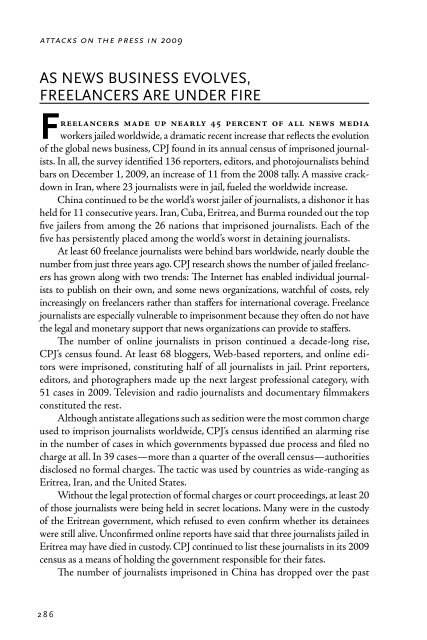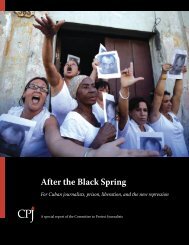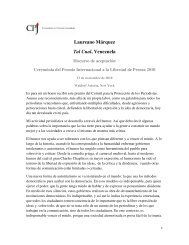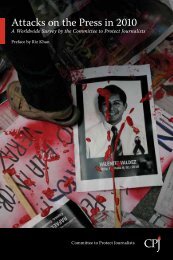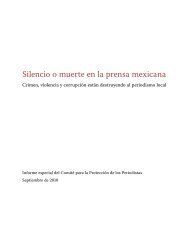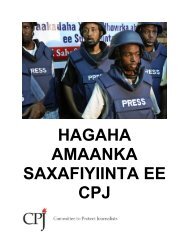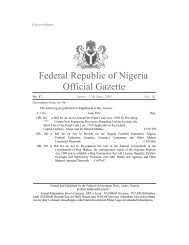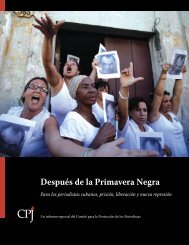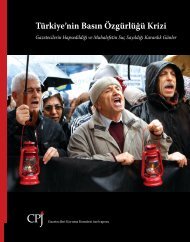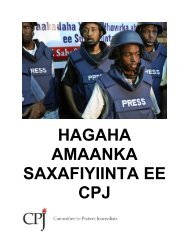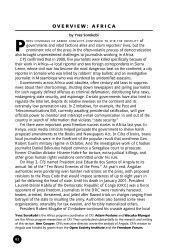Attacks on the Press - Committee to Protect Journalists
Attacks on the Press - Committee to Protect Journalists
Attacks on the Press - Committee to Protect Journalists
- No tags were found...
Create successful ePaper yourself
Turn your PDF publications into a flip-book with our unique Google optimized e-Paper software.
attacks <strong>on</strong> <strong>the</strong> press in 2009journalists in pris<strong>on</strong>: analysisAS NEWS BUSINESS EVOLVES,FREELANCERS ARE UNDER FIREFreelancers made up nearly 45 percent of all news mediaworkers jailed worldwide, a dramatic recent increase that reflects <strong>the</strong> evoluti<strong>on</strong>of <strong>the</strong> global news business, CPJ found in its annual census of impris<strong>on</strong>ed journalists.In all, <strong>the</strong> survey identified 136 reporters, edi<strong>to</strong>rs, and pho<strong>to</strong>journalists behindbars <strong>on</strong> December 1, 2009, an increase of 11 from <strong>the</strong> 2008 tally. A massive crackdownin Iran, where 23 journalists were in jail, fueled <strong>the</strong> worldwide increase.China c<strong>on</strong>tinued <strong>to</strong> be <strong>the</strong> world’s worst jailer of journalists, a dish<strong>on</strong>or it hasheld for 11 c<strong>on</strong>secutive years. Iran, Cuba, Eritrea, and Burma rounded out <strong>the</strong> <strong>to</strong>pfive jailers from am<strong>on</strong>g <strong>the</strong> 26 nati<strong>on</strong>s that impris<strong>on</strong>ed journalists. Each of <strong>the</strong>five has persistently placed am<strong>on</strong>g <strong>the</strong> world’s worst in detaining journalists.At least 60 freelance journalists were behind bars worldwide, nearly double <strong>the</strong>number from just three years ago. CPJ research shows <strong>the</strong> number of jailed freelancershas grown al<strong>on</strong>g with two trends: The Internet has enabled individual journalists<strong>to</strong> publish <strong>on</strong> <strong>the</strong>ir own, and some news organizati<strong>on</strong>s, watchful of costs, relyincreasingly <strong>on</strong> freelancers ra<strong>the</strong>r than staffers for internati<strong>on</strong>al coverage. Freelancejournalists are especially vulnerable <strong>to</strong> impris<strong>on</strong>ment because <strong>the</strong>y often do not have<strong>the</strong> legal and m<strong>on</strong>etary support that news organizati<strong>on</strong>s can provide <strong>to</strong> staffers.The number of <strong>on</strong>line journalists in pris<strong>on</strong> c<strong>on</strong>tinued a decade-l<strong>on</strong>g rise,CPJ’s census found. At least 68 bloggers, Web-based reporters, and <strong>on</strong>line edi<strong>to</strong>rswere impris<strong>on</strong>ed, c<strong>on</strong>stituting half of all journalists in jail. Print reporters,edi<strong>to</strong>rs, and pho<strong>to</strong>graphers made up <strong>the</strong> next largest professi<strong>on</strong>al category, with51 cases in 2009. Televisi<strong>on</strong> and radio journalists and documentary filmmakersc<strong>on</strong>stituted <strong>the</strong> rest.Although antistate allegati<strong>on</strong>s such as sediti<strong>on</strong> were <strong>the</strong> most comm<strong>on</strong> chargeused <strong>to</strong> impris<strong>on</strong> journalists worldwide, CPJ’s census identified an alarming risein <strong>the</strong> number of cases in which governments bypassed due process and filed nocharge at all. In 39 cases—more than a quarter of <strong>the</strong> overall census—authoritiesdisclosed no formal charges. The tactic was used by countries as wide-ranging asEritrea, Iran, and <strong>the</strong> United States.Without <strong>the</strong> legal protecti<strong>on</strong> of formal charges or court proceedings, at least 20of those journalists were being held in secret locati<strong>on</strong>s. Many were in <strong>the</strong> cus<strong>to</strong>dyof <strong>the</strong> Eritrean government, which refused <strong>to</strong> even c<strong>on</strong>firm whe<strong>the</strong>r its detaineeswere still alive. Unc<strong>on</strong>firmed <strong>on</strong>line reports have said that three journalists jailed inEritrea may have died in cus<strong>to</strong>dy. CPJ c<strong>on</strong>tinued <strong>to</strong> list <strong>the</strong>se journalists in its 2009census as a means of holding <strong>the</strong> government resp<strong>on</strong>sible for <strong>the</strong>ir fates.The number of journalists impris<strong>on</strong>ed in China has dropped over <strong>the</strong> pastseveral years, but with 24 still behind bars <strong>the</strong> nati<strong>on</strong> remained <strong>the</strong> world’s worstjailer of <strong>the</strong> press. Of those in jail in China, 22 were freelancers. They includedDh<strong>on</strong>dup Wangchen, a documentary filmmaker who was detained in 2008 afterrecording footage in Tibet and sending it <strong>to</strong> colleagues overseas. A 25-minute filmtitled “Jigdrel” (Leaving Fear Behind), produced from <strong>the</strong> footage, features ordinaryTibetans talking about <strong>the</strong>ir lives under Chinese rule. Officials in Xining,Qinghai province, charged <strong>the</strong> filmmaker with inciting separatism.Most of those impris<strong>on</strong>ed in Iran, <strong>the</strong> world’s sec<strong>on</strong>d-worst jailer, were sweptup in <strong>the</strong> government’s post-electi<strong>on</strong> crackdown <strong>on</strong> dissent and <strong>the</strong> news media.Of those, about half were <strong>on</strong>line journalists. They included Fariba Pajooh, a freelancereporter for <strong>on</strong>line, newspaper, and radio outlets. Radio France Internati<strong>on</strong>alereported that she was charged with “propagating against <strong>the</strong> regime” andpressured <strong>to</strong> make a false c<strong>on</strong>fessi<strong>on</strong>.Cuba, <strong>the</strong> third-worst jailer, was holding 22 writers and edi<strong>to</strong>rs in pris<strong>on</strong>, all buttwo of whom were rounded up in Fidel Castro’s massive 2003 crackdown <strong>on</strong> <strong>the</strong>independent press. Many have seen <strong>the</strong>ir health deteriorate in inhumane and unsanitarypris<strong>on</strong>s. The detainees included Normando Hernández G<strong>on</strong>zález, who sufferedfrom cardiovascular ailments and knee problems so severe that even standing wasdifficult. Hernández G<strong>on</strong>zález was moved <strong>to</strong> a pris<strong>on</strong> hospital in late Oc<strong>to</strong>ber.Eritrea was <strong>the</strong> world’s fourth-worst jailer, impris<strong>on</strong>ing 19 journalists as ofDecember 1. Eritrean authorities have jailed not <strong>on</strong>ly independent reporters but<strong>the</strong>ir own, state-employed journalists as well. The government arrested six statejournalists in early 2009 <strong>on</strong> suspici<strong>on</strong> that <strong>the</strong>y had provided informati<strong>on</strong> <strong>to</strong> foreignnews organizati<strong>on</strong>s and Web sites.With nine journalists behind bars, Burma was <strong>the</strong> world’s fifth-worst jailer.Those in cus<strong>to</strong>dy included <strong>the</strong> video journalist known publicly as “T,” who reportednews for <strong>the</strong> Oslo-based media organizati<strong>on</strong> Democratic Voice of Burmaand who helped film an award-winning internati<strong>on</strong>al documentary, “Orphans of<strong>the</strong> Burmese Cycl<strong>on</strong>e.” Journalism is so dangerous in Burma, <strong>on</strong>e of <strong>the</strong> world’smost censored countries, that undercover reporters such as “T” are a crucial c<strong>on</strong>duit<strong>to</strong> <strong>the</strong> world.The Eurasian nati<strong>on</strong>s of Uzbekistan and Azerbaijan placed sixth and seventh<strong>on</strong> CPJ’s dish<strong>on</strong>or roll. Uzbekistan was holding seven journalists, am<strong>on</strong>g<strong>the</strong>m Dilmurod Saiid, a freelancer who exposed government agricultural abuses.Azerbaijan was jailing six reporters and edi<strong>to</strong>rs, including investigative journalistEynulla Fatullayev, a 2009 CPJ Internati<strong>on</strong>al <strong>Press</strong> Freedom Awardee.Here are o<strong>the</strong>r trends and details that emerged in CPJ’s analysis:»»About 47 percent of journalists in <strong>the</strong> census were jailed under antistatecharges such as sediti<strong>on</strong>, divulging state secrets, and acting against nati<strong>on</strong>al286287


